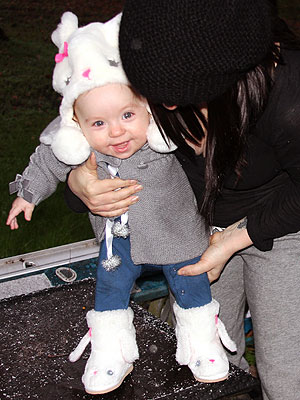
In front of the Christmas Tree – Courtesy Jenna von Oy
Celebrity blogger Jenna von Oy is a new mama!
Best known for her roles as Six on Blossom and Stevie on The Parkers, von Oy is also a musician who has released two albums and is set to publish a book, The Betweeners.
von Oy, 35, wed Brad Bratcher on Oct. 10, 2010, and resides in Nashville with her husband and five dogs.
They welcomed their first child, daughter Gray Audrey, on May 21. She is now almost 8 months old.
In her latest blog, von Oy reflects on the spirit of Christmas — and celebrating the holiday with Gray.
You can find her on Facebook and Twitter @JennavonOy, as well as posting on her weekly blog, The Cradle Chronicles.
I realize it’s January now, and you’ve probably taken down your holiday lights. You’ve stowed the stockings, eaten all of the cookies and put away the gifts. But in my house, the Christmas spirit is still alive and well. Christmas has not left the building. Our tree is still whiling away the hours in our living room, and it isn’t because I’m lazy or haven’t found time to return everything to the attic. I just wanted to wake up to it for one more week, to enjoy the season a bit longer, to absorb the hope and happiness it brings.
Christmastime has always been truly magical for me. I believe it isn’t just a time of year; it’s a state of being. Regardless of your spiritual upbringing, it’s a season for togetherness, joy, peace, and goodwill. It’s a time to treasure those you love, in a profoundly meaningful way … especially your children. There’s no other season that incites wonder quite like Christmas, and seeing it through the eyes of my daughter for the first time was nothing short of miraculous. We have begun the holiday memories she will think back on fondly one day.
It inspires me to reminisce about my own special Christmas moments, especially those shared with my siblings: penning wish lists for Santa, trudging through snow to choose the “jolliest” tree we could find, hanging stockings on our mantle, putting our boots out in celebration of the German holiday of Saint Nicholas (the boots would get filled with nuts, fruit and other goodies), baking cookies and over-decorating them, festooning our tree in the ornaments we’ve collected each year since we were born, and dancing maniacally to “The Nutcracker Suite.”
I miss the winter wonderland of our East Coast upbringing: ice skating on the pond behind the home in which we were raised, watching snowflakes blanket the ground like frosting (it just begged for snowmen and snow angels to be made), sledding down our driveway in makeshift toboggans, and warming up in front of the fire with mugs of mulled cider. Those were the days!
But it isn’t all of the “deck the halls” and “fa-la-la” that made my spirit bright. Most importantly, the holiday season meant time spent with my family. It meant hunkering down out of the bitter cold and playing board games, while Burl Ives sang “A Holly Jolly Christmas” in the background. It meant attending midnight mass on Christmas Eve, and listening to my dad’s beautiful voice resonate from the choir. It was the joy of finding the perfect gift for my sister or brothers, and the glee of watching them unwrap it.
Even in adulthood, I find the Christmas magic hasn’t gone anywhere. It’s still in my heart, though its style has morphed a bit. Now I get to celebrate with my own little family, embracing long-held traditions while creating new ones with my husband and daughter.
I thought it might be fun to share some of them with you. I warn you, if you are feeling a bit of “bah humbug” and want Christmas to just go away already, this may not be the blog for you … I’ll begin with our “infamous Christmas tape.”

Me back in 1980 – Courtesy Jenna von Oy
Many years ago, my siblings and I acquired a cassette tape of a schizophrenic compilation of Christmas music. It contains everything from Mahalia Jackson’s “Go Tell It On The Mountain,” to Johnny Mathis singing “Sleigh Ride,” to the Philadelphia Orchestra playing the “Hallelujah Chorus.” Like I said, it’s a wacky mix of tunes. Regardless, it’s our auditory mascot during Christmas. A year without hearing this crazy collection of songs would be a sad year, indeed.
The four of us used to jam to it while trimming the tree, and it was almost always accompanied by our crooning at the top of our lungs and dancing wildly around the living room. This was typically followed by a period of breathlessness and tearful laughter. My poor parents either hid or videotaped it. Want to know how to shed the pounds from over-indulging in Christmas cookies? The routine I just mentioned will definitely do it. I’ll spare you any sort of visual, but take my word for it … it’s a special breed of insanity aerobics.
The calamity often occurred into the wee hours of the morning, since we were generally high on sugar when it all went down. We found that the addition of hot cocoa or eggnog greatly improved our stamina. I’ve long suspected this display of madness would frighten away potential suitors or spouses, but I’m happy to report Brad has stuck around despite this tradition. He has witnessed it on several occasions and, while he has declined any participation in it, he hasn’t disowned me yet. 
I must admit it wasn’t quite the same this year without my siblings around to share in my decorating dance-a-thon. Sadly, leaping across the kitchen via Skype just doesn’t have the same effect. This didn’t stop me, however, from showing my daughter what the hype is all about. I transferred that wonderfully awful cassette tape to my iPod, and Gray and I danced like no one was watching. She was all smiles and laughter. I can only hope the Christmas enthusiasm runs through her veins, as it does mine!
Another family tradition involves our ongoing ornament collection. My mom began the custom of gifting each of us kids with a yearly ornament, beginning at our births. The keepsakes have always served as a reminder of the wonderful memories we shared that year, often depicting something meaningful we experienced. For example, the first year I visited France, I received a mini Eiffel Tower to suspend from the pine branches. When I played “Molly” in a regional production of Annie at the age of six, I got a Little Orphan Annie ornament. It’s neat to go back through the years to see what stories our tree adornments conjure up!
Brad and I are continuing this collection with Gray, and she ended up with several ornaments this year. I hope they will always be a reminder of her first Christmas, and I look forward to passing them along to her once she is married and has a family of her own.
This tradition actually gave way to a new one as well … A few weeks before Christmas, once our main tree was already dressed and lit with the normal accoutrements, Gray got to pick out a smaller tree to host all of her special ornaments. She also had the honor of placing the first decoration on the larger one. Now that Christmas is over, we are going to find a spot in our yard to plant the sapling. I think it’s a great way to show her the importance of giving back to the earth, and it will be a neat project for us as a family.

Bratcher Family Photo 2012 – Lila McCann Photography
The side benefit of this new tradition is that it helps to satisfy my need for a real evergreen in the house. Though I grew up in a family where we never dreamed of putting up a plastic tree, I’ve had to switch gears a bit in the past few years. Two words for you: Basset Hound. Evidently Christmas trees are the equivalent of a five-star gourmet meal to our sweet Mia, and the ornaments are her canine caviar. She will take any opportunity to snack on the branches if they are real pine, which we found out the hard way.
Needless to say, we’ve had a huge plastic deal ever since. At least the smaller tree that Gray chose fits on a tabletop, where it is out of reach! Mia’s Scrooge-like master plan has officially been thwarted. Now if I could just keep our pug, Bruiser, from unwrapping presents before Christmas morning…
So now that you know some of our special yearly customs, here’s an idea of how Gray’s first Christmas went down: I suppose it began the first week of December, with our official Christmas photo shoot. Though attempting to get all three of us to smile simultaneously was documentary-worthy, I’m thrilled to say it actually happened.
I give full credit to the patience of our photographer, Lila, who also happens to be one of my best friends. Since she has two children of her own, she’s well aware of the trials and tribulations of photographing a child in the throes of the naptime hour. Fun was had by all, especially when a tantrum began rearing its ugly head as we approached the agreed upon location. Granted, Gray immediately perked up when she saw the camera turn its focus onto her. Go figure.
My mom spent the first two weeks of December with us, and we got to bake cookies and peanut brittle together … Okay, I’m lying. I spent the time trying to keep my daughter’s hands out of the flour and butter, while my mom wound up doing the bulk of the work. I think I got more exercise during the whole affair, but my mom put in the baking time. She has been generous enough to tell everyone we made the tasty treats together, but I thought I should set the record straight; I was on baby duty. The cookies were mostly her doing. (Thank you, Mommy!)
The neat part was that she got to be here for a plethora of Gray’s first holiday experiences, such as picking out the baby tree, decorating the house in its holiday attire, and the aforementioned family photo extravaganza. It was a very special time for us, and made it feel a lot more like Christmas. (I should also point out that the number of gifts Gray wound up getting virtually doubled in size, thanks to my mother and mother-in-law. Grandmas sure do love to spoil their grandbabies!)
One other adventure my mom got to be present for was Gray’s first picture with Santa. We waited until a weekday morning, to avoid crowds, and headed over to experience all that is jolly old St. Nick at the mall. I’ll be honest — my cynical side anticipated a fraud. I envisioned a scary, spiked eggnog-breathing, smoker’s cough-hacking, faux-bearded, senile, skinny guy in a fat suit, smiling at all of the children in a way that makes every mother’s stomach turn.

First Picture with Santa – Worldwide Photography
I couldn’t have been farther off. This guy was the real deal. And when he said to Gray, “I’d take you to the North Pole if I could,” I actually believed he meant it in the sweetest way possible. Santa was the kindest man I could have asked for. And you know what? Gray knew it too. My little girl, who has been battling some serious bouts of separation anxiety, reached out for Santa like she’d known him all her life. The photographers said she was the first kid all day to smile for a photo … which made my day almost as much as it made theirs!
On Christmas morning, Bruiser demonstrated how presents should be opened (in his world: frenzied and with no regard for content…). Gray sort of got the hang of it, though next year will be more of a sight to see, I imagine. We took it easy with gifts this year … quality not quantity. Instead, our gifts were mostly in the form of time together, since my husband got a week off from work.
It was such a joy to cuddle up together on the sofa, even if it is nowhere near large enough to comfortably fit all of our human and canine family members. We watched time-treasured classics such as Rudolph The Red-Nosed Reindeer and the original version of How the Grinch Stole Christmas. In a very merry post-gift unwrapping fatigue, Gray fell asleep on her Daddy’s chest and took a little nap. Brad said it was the best Christmas present he could have received. Sometimes the most cherished gifts don’t come in a package tied with ribbon.
Moving on to a slightly less magical subject, many friends said they sneezed and vomited their way through the remainder of 2012. Thankfully, we made it through without getting sick. We were desperately trying to spread Christmas cheer instead of germs this year, which is often hard with young kids. I can’t remember the last time I didn’t lose my voice during the holidays, so I was thrilled to get through unscathed.
Then again, you ain’t heard nothin’ until you’ve heard my Darth Vader-esque rendition of “Joy To The World,” which I usually grace everyone with at the mass on Christmas Eve. It brings anything but joy to the world, I can promise you that. Instead, I was able to sing loud and proud this year. Gray even tried to join in! The irony? As I publish this blog, I’m plagued with a cold … at least it allowed me to ring in the New Year first.
Much to our dismay, no snow fell in advance of our holiday here in Nashville. We did not wake up to a white Christmas morning. However, we had just enough of a flurry in the days following, to don boots and gloves and let Gray experience her first snowfall. It was really only a minor dusting, but she was mesmerized and commenced “tap dancing” in the snow.
For those who are currently picturing some fantastic routine involving staccato wings and ball changes, being executed by world-class artists such as Savion Glover and Gregory Hines, you may want to rethink your visual. Our version consisted of my holding Gray’s body upright, while she shuffled her feet around. Snow and dirt were flying everywhere, but my kid was as happy as … well, a kid in snow.

Gray’s first snow! – Courtesy Jenna von Oy
If you kept reading until the end of this post, I’m impressed. Santa’s list isn’t as lengthy as this month’s blog, so I hope you’ll forgive the verbosity. I guess I was swept up in the holiday magic and excitement. Perhaps my New Year’s resolution should include minimalizing my words? 
I hope you and yours had a fantastic holiday, filled with love, laughter and endless blessings. We wish you many more in 2013, and pray you are surrounded by the Christmas spirit all year long!
Until next time,
– Jenna von Oy
More from Jenna’s PEOPLE.com blog series:














